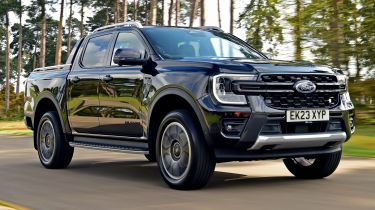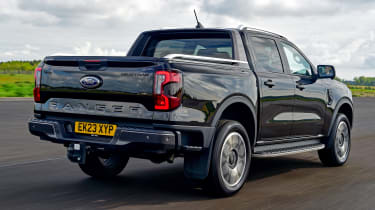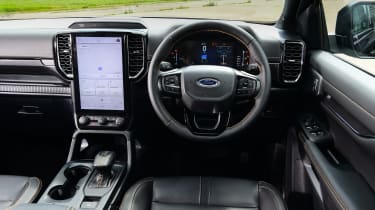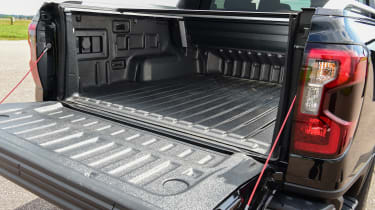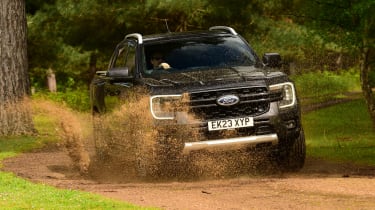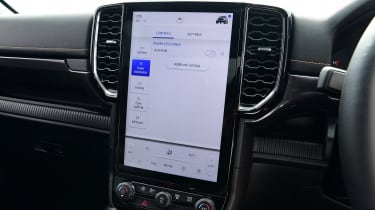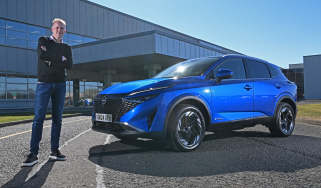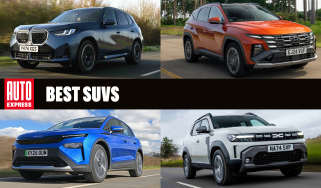Ford Ranger pick-up review
The Ford Ranger injects more tech and style into the already highly capable pick-up

The latest Ford Ranger improves on its award-winning predecessor by injecting more style and technology into the mix. Its handsome, square-jawed looks and upmarket cabin gives SUVs a run for their money, while the variety of body styles and trim levels mean there’s a Ranger to suit all needs. The Double Cab version in particular is a great choice for business users who want a capable workhorse that can also serve as a versatile family car when they’re off the clock.
Our choice: Ford Ranger 3.0 EcoBlue Wildtrak
About the Ford Ranger
We’re big fans of the Ford Ranger at Auto Express because it’s now won our Pick-up of the Year award five years on the trot, from 2019 to 2023. But seeing as the Ranger has also been the best-selling pick-up truck in the UK and Europe, we’re not alone in our admiration of the Ranger.
The (2011-2022) Ford Ranger had a trophy cabinet fit to burst, but after a little over a decade on sale, it was very much feeling its age by the time it was laid to rest. That’s when the latest Ranger strolled into town, with more of a resemblance to Ford’s iconic F-Series pick-up trucks this time around, and some big upgrades for the cabin.
Used - available now

2016 Tesla
Model S
78,000 milesAutomaticElectric
Cash £18,999
2022 Vauxhall
Corsa
26,937 milesManualPetrol1.2L
Cash £11,849
2019 Ford
Fiesta
39,872 milesManualPetrol1.1L
Cash £8,749
2020 Vauxhall
Corsa
21,191 milesManualPetrol1.2L
Cash £11,549The Ranger is longer and wider than before, while its bluff front end and square-jawed looks emulate the Ford F-150. Combined with the distinctive C-shaped daytime running lights and large Blue Oval in the middle of the wide grille, the Ranger has a rather imposing look – not something you’d normally say about a commercial vehicle.
Another cue swiped from its all-American brethren is the Ranger name stamped into the tailgate, as opposed to the stickers seen on the old model. Ford also added a handy step to the bodywork behind the rear wheel (on higher-spec variants) after customer feedback found owners were using the rear tyre to step up to access the cargo area. The truck bed is larger, while the Ranger still satisfies the one-tonne payload requirement that's needed for a pick-up to qualify as a light commercial vehicle. You can even use the tailgate as a workbench thanks to built-in holes for clamps.
The Ranger’s dashboard is dominated by a huge touchscreen, similar to the Ford Mustang Mach-E’s, and running Ford's latest SYNC 4 connected infotainment system.
The competition in the pick-up class isn’t what it once was now that the Nissan Navara, Mercedes X-Class, and Mitsubishi L200 are all gone. The Ranger’s closest competition is still the Toyota Hilux, which is also offered in two-door Single Cab and four-door Double Cab forms, and with a variety of trim levels and engines to choose from.
Another key rival is the second-generation Volkswagen Amarok. The two models are a product of a joint venture between VW and Ford, so the Amarok actually uses the Ranger’s platform, engine and gearbox configurations. More utilitarian options include the Isuzu D-Max and SsangYong Musso.
The regular Ranger is offered with two EcoBlue diesel engines: a 2.0-litre turbocharged four-cylinder engine and 3.0-litre V6, although the power output differs depending on which model you go for. Lower-spec models get the four-pot paired with a six-speed manual while the rest of the range features a 10-speed automatic transmission.
The two-door Single Cab Ranger is only available in the most basic XL trim, while the four-door Double Cab can be had across all trim levels (XL, XLT, Tremor, Wildtrak, Wildtrak X and Platinum). The mid-range Wildtrak comes with pretty much all the kit you might need, including part-leather upholstery, heated front seats and steering wheel, electrically adjustable driver's seat, dual-zone climate control, privacy glass, comfort suspension, LED lights, keyless entry and starting, digital driver’s display, and a 12-inch touchscreen.
Ford Ranger Tremor and Wildtrak X versions are more off-road focused machines that are both fitted with Bilstein off-road dampers, a steel bash plate, reworked suspension and chassis components, plus some trick systems like Trail Control. It’s essentially a low-speed cruise control, so drivers can select a speed below 20mph and the Ranger will maintain that speed over terrain while the driver concentrates on steering.
For those who want to splurge, Platinum models add luxuries like 20-inch machined alloy wheels, 10-way adjustable, heated and cooled quilted leather seats, open-grain maple wood trim, LED ambient lighting and an eight-speaker B&O sound system.
The Ranger Raptor has also returned for the second-gen model; available with either a 202bhp EcoBlue four-cylinder diesel or a 282bhp Ecoboost V6 petrol engine. Both versions get the 10-speed auto, plus more advanced Fox dampers (which are independently adjustable), launch control, a front diff lock, an anti-lag system to keep its turbos spinning and an Active Exhaust mode with a ‘Baja’ setting that Ford says is not for use on public roads.
MPG, CO2 and Running Costs
Electrification is the aim of the game in the automotive industry right now, as it seems every model is either going electric or being fitted with some kind of hybrid system. Even Ford has launched the all-electric F-150 Lightning in North America. However, the Ranger has stuck with good old diesel power for the most part, which has done nothing to change the pick-up's uneconomical reputation. Especially when features such as auto Stop/Start are reserved for higher-spec models.
According to Ford, the 2.0-litre four-cylinder Bi-Turbo EcoBlue diesel will return 33.6mpg on average in base Single Cab models fitted with a six-speed manual. Meanwhile, Double Cab models with a more powerful version of the same engine and 10-speed automatic are expected to return between 27.2mpg and 32.1mpg at best, depending on which trim you choose.
At least the Ranger has shown us it can achieve close to its claimed figures. We covered close to 200 miles during our time with a 2.0-litre Wildtrak model and managed to average 31.1mpg. At that rate, with a full 80-litre tank of diesel, you could cover 547 miles between trips to the pumps.
The 3.0-litre EcoBlue V6 is only offered with the auto ‘box and will return 27.9mpg on average in Wildtrak and Platinum trim models. The V6 also proved to be as efficient as Ford claims, as we managed to average 27.5mpg during our group test between the Ranger, Toyota Hilux, and Volkswagen Amarok.
Unsurprisingly, the Ranger Raptor is the least efficient of the pack. Equipped with the EcoBlue diesel four-pot, the Baja-prepped performance pick-up will return 26.6mpg. Spring for the top-of-the-range petrol 3.0-litre Ecoboost V6, with all its 288bhp, and Ford reckons you’ll average 20.5mpg.
CO2 emissions range from 220g/km for the base Single Cab diesel to a whopping 315g/km for the petrol-powered V6 Raptor.
The Ford Ranger’s insurance ratings range from group 39 for the basic single cab in XL trim to group 45 for the largest-engined double cab model in Platinum spec. The Raptor twins sit in groups 41 and 42, depending on whether you get the diesel or petrol engine.
Load Space and Practicality
The Ford Ranger isn’t a one-size-fits-all pick-up. The base Single Cab is a traditional two-seater pick-up that offers a maximum load length of 2,332mm and 1,207kg gross payload – the highest of the Ranger family.
Step up to the Double Cab, and you gain a rear seat bench. The rear seats have been reprofiled to be more comfortable for passengers this time around, and there’s ample space in the back for adults. Rear passengers also get a centre armrest with cup holders, air vents and USB sockets (one Type A and one Type C) to keep their devices charged. It’s no SUV, but the Ranger can pull double duty as a workhorse and family car when needed.
Most Double Cab Rangers satisfy the one-tonne payload requirement that's needed for a pick-up to qualify as a commercial vehicle, with the XLT model able to haul the most – 1,099kg to be exact. The only Ranger that doesn’t meet this threshold is the Raptor, with a maximum payload of 652kg for the 3.0 Ecoboost petrol and 760kg for the 2.0 EcoBlue diesel. Both figures are somewhat short of the 1,040kg threshold required for LCV classification, and because the Raptor can’t be classed as a light commercial vehicle, it doesn’t qualify for the Benefit-In-Kind (BiK) tax advantage that draws many towards buying a pick-up.
We measured the bed of the Ranger Double Cab ourselves when we tested it and found the maximum load length to be 1,575mm. We also found the maximum load width is 1,515mm, but this narrows to 1,190mm towards the rear of the bed due to the wheel arches. The drop-down tailgate features holes for clamps so that it can be used as a workbench. If you run out of room in the bed, all regular Rangers are rated to tow a trailer up to 3,500kg. The Raptor, on the other hand, can only tow 2,500kg.
Ford offers a huge number of accessories for the Ranger. Take a gander through the options list, and you’ll find spray-in bed liners, a flexible rack system and dividers for the load bed, and hard-top canopies that essentially turn the Ranger Double Cab into a full-size SUV. Alternatively, to create secure storage, you can add a conventional soft tonneau cover, a manual roll-top cover and even a power-opening roll-top cover. You open the latter simply by tapping a button on the key or the inside of the load bed. However, we found that the cover’s plastic housing eats up quite a bit of space towards the rear of the load bed.
Reliability and safety
The Ford Ranger has always been near the top of the pick-up class in terms of safety, and the latest model is no different. It was put through Euro NCAP’s battery of crash tests in 2022 and was awarded the maximum five out of five-star safety rating. It received an 84 per cent score for adult occupant protection and safety assistance technology, 90 per cent for child occupant protection and 74 per cent for the vulnerable road user categories. Unsurprisingly, the similar VW Amarok received the same marks. The Ranger and Amarok did better in most areas against the only other pick-up that’s been tested under the same criteria, the Isuzu D-Max, with only the Crew-Cab version of the latter getting a superior 86 per cent in adult occupant protection.
All Rangers come with several airbags, seatbelt reminders, ABS, Ford’s ESP+ stability control system, collision mitigation, speed sign recognition, lane keeping aid and a rear-view camera. Additional safety kit, including a 360-degree camera set-up, lane change warning, blind spot monitoring and adaptive cruise control, are available as part of the several Technology Packs Ford offers.
It’s too early to gauge the second-generation Ranger’s reliability, but you're never far from a Ford dealer or Transit Centre for a service or if spares are required. All Rangers come with a three-year/60,000-mile warranty, which is pretty standard for the class. You get a year of Ford Assistance breakdown cover and a 12-year anti-perforation warranty thrown in. You can also add an extended warranty and service plans should you wish.
Driving and Performance
So far, we’ve only had a chance to drive the mid-range Wildtrak and high-performance Ranger Raptor, although we’ve reviewed the Raptor separately.
Unsurprisingly, the Ranger feels very big to drive on UK roads, but no more than a full-size SUV does. In fact, because of the Ranger's high-set driving position, you get a commanding view ahead that’s better than most SUVs, although the tall bonnet does limit the view immediately ahead.
Thankfully, Wildtrak models come with front and rear parking sensors, plus a 360-degree camera system. The latter provides a clear image of what’s around you via the high-res central touchscreen, helping to make it easy enough to manoeuvre the Ranger into spaces thanks to its camera system – although the sheer size of the truck means you will stick out of a typical supermarket parking space by a couple of feet. The relatively light steering also helps when negotiating your way around a tight car park.
The 2.0-litre four-cylinder delivers decent power, but that was without any cargo to haul. We did notice a fair amount of rev hang after lifting off the throttle and a noticeable delay in acceleration when you plant your right foot on the accelerator. We suspect the latter is caused by the 10-speed automatic gearbox having to kick down several gears when you demand more power. It can also be quite jerky at lower speeds, but once you’re out of town and driving at higher speeds, the 10-speed auto delivers smooth, seamless shifts.
We found the Ranger is at its best when cruising on the motorway, where the 2.0-litre diesel becomes quiet and road noise is kept in check for the most part. There is a noticeable amount of wind noise at higher speed, but that’s to be expected with such a bluff front end as the Ranger’s. An excellent adaptive cruise control system and lane keep assistance also help make the Ranger a solid cruiser.
The V6 diesel is a lot smoother than the four-cylinder. It sounds silky at all speeds, and it delivers decent punch in everyday driving. However, we did find the truck to be a little hesitant to deliver maximum power when accelerating hard, as if it’s restricting power to prevent damage to the transmission. Like the less powerful four-cylinder, response times improve at higher speeds.
When it comes to their ride, pick-up trucks need to find a balance between comfort and the ability to cope with a one-tonne payload, and the Ranger manages to offer a smooth ride similar to that of an SUV. During our group test between the Ford Ranger, VW Amarok, and Toyota Hilux we found the Ford had the smoothest and most comfortable ride of the trio. That’s thanks to the combination of modest 18-inch wheels, high-profile tyres, and the Soft Ride comfort suspension fitted to the Ranger Wildtrak we tested. Without any cargo in the bed, you only tend to feel the biggest bumps and imperfections in the Ford, whereas its VW sister car tends to shudder and shake.
Cab and Interior
The Ford Ranger’s interior was already relatively upmarket (at least by pick-up truck standards), but the latest model has gone a good few steps further. In fact, we reckon it could give some well-regarded SUVs a run for their money.
As soon as you climb in, your eyes are drawn to the enormous central touchscreen that dominates the dashboard. In lower-spec models, it’s a pretty substantial 10-inch unit, while others (like the Wildtrak we drove) feature a huge 12-inch portrait-style display. Both versions run Ford’s latest SYNC 4 infotainment, which is pretty slick and has quick load times, but the blue font on white backgrounds can be a little distracting.
Both Apple CarPlay and Android Auto are standard-fit. The smartphone projection only takes up about half the screen, which might disappoint some, but it means you have climate controls and handy shortcuts to the settings menu there all the time. It’s also good to see Ford hasn’t given up on good old-fashioned physical buttons, unlike its VW Amarok sibling, because there’s an array of them below the central touchscreen for the climate control and audio systems.
The crisp digital instrument panel provides ample information, from fuel economy to 4x4 status. The display also changes depending on the drive mode you select. However, we weren’t able to display a full map view even when using Ford’s own sat-nav; we could only provide turn-by-turn instructions. The digital driver instrument cluster in the Amarok can manage this and is generally more configurable.
There is a range of driving modes, which you switch through using the rotary dial on the centre console. On top of this are four buttons, which also allow you to select between two, and four-wheel drive modes.
The Ranger's redesigned cab has more space inside, and the addition of an electric parking brake also helps to free up space on the centre console. There’s plenty of storage space, including two cupholders in the centre console, plus two more that pop out from either end of the dashboard, twin glove boxes and a shelf in between, and another bin under the central armrest. There’s also a tray for your smartphone in the dash, which includes a wireless charging pad in pricier models.
The front seats are wide and comfortable and offer lots of adjustability, although the headrests are as hard as rocks. The Ranger’s interior door handles take a bit of getting used to because they’re inside the grab handles on the doors, and aren’t that easy to spot.
Key touchpoints feel very high quality, including the steering wheel, tops of the doors and centre console. However, poke around a bit and it doesn’t take long to find some hard, scratchy plastics. We have no doubt they’ll be durable and suit lower-spec versions destined to be workhorses, but they’re a bit of let down in the cabin of plusher models, which some will be considering as a family SUV alternative.
Pick-up dimensions
| Body style | Height | Width | Length |
|---|---|---|---|
| Single Cab | 1,880mm | 1,918mm (2,208mm inc mirrors) | 5,370mm |
| Double Cab | 1,884mm | 1,918mm (2,208mm inc mirrors) | 5,370mm |
Load area dimensions
| Body style | Height | Width | Length |
|---|---|---|---|
| Single Cab | 529mm | 1,224-1,584mm | 2,332mm |
| Double Cab | 529mm | 1,224-1,584mm | 1,564mm |
Frequently Asked Questions
The Ford Ranger is more practical, more comfortable and better equipped than ever, with a wide range of models available to suit all needs.

